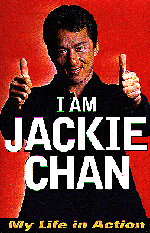GOLDSEA | ASIAN BOOKVIEW | MEMOIRS
I Am Jackie ChanMy Life in Action
by Jackie Chan, with Jeff Yang
Ballantine Books, New York, 1998, 355pp, $24.95
EXCERPT:
 was born on April 7, 1954, the only son of Charles and Lee-lee Chan. They
named me Chan Kong-sang, which means "Born in Hong Kong" Chan.
was born on April 7, 1954, the only son of Charles and Lee-lee Chan. They
named me Chan Kong-sang, which means "Born in Hong Kong" Chan.
I guess my parents weren't very original when it came to names. Or maybe
they just wanted to celebrate their relief at making it to Hong Kong, as
survivors of a breathless escape from the turmoil of the mainland. Hong
Kong was the promised land, a place that offered safety and prosperity. A
place where new lives could begin.
By the Chinese calendar, 1954 was the Year of the Horse.
According to superstition, the Horse is a sign of energy, ambition, and
success. It's a good year to be born in if you're a boy--not such a good one if
you're a girl, because tradition says that a female Horse will have trouble
finding a proper husband--and my parents were happy that I came into the
world under such a fortunate sign. Of course, my arrival in the Year of the
Horse was hardly a coincidence; actually, it took an awful lot of stubbornness
on my part to pull it off! Most babies are born nine months after being
conceived. I, on the other hand, stuck around an extra three months, until
my mother was forced to go to a surgeon to bring me into the world, kicking
and screaming, by caesarean section.
Maybe, it was my rebellious streak that made me refuse to join my parents
on time, or maybe it was a premonition of what my future would hold.
After all, while comfortably inside my mother, I had privacy, sleep, and all
the food I could ever ask for, without having to fight or work or suffer. In
fact, I can honestly say that those extra three months were the easiest time
of my life.

Norhing like that waited for me in the world outside. Hong Kong in the '50s was a hard and restless place, and my family's position there was at the very bottom of the social ladder, among the thousands of destitute migrants who'd fled to the British colony after the mainland's Communist Revolution. Still, as poor as we were, we felt lucky to have survived China's civil war, and especially grateful that my parents had good jobs in the strange new society of the island. Many of our fellow refugees had arrived in Hong Kong with nothing but the clothes on their back and the memories of what they'd left behind. They lived in shacks in the island's crowded ghettos, making paper flowers and cheap trinkets to survive, or turning to less socially accepted--and more dangerous--pursuits.
ASIAN AIR ISSUES FORUM |
CONTACT US
© 1999-2003 GoldSea
No part of the contents of this site may be reproduced without prior written permission.
